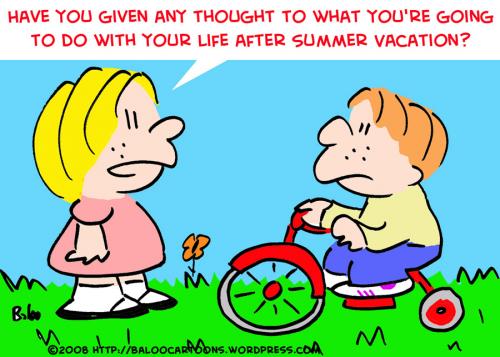The Real Reason U.S. Schools Have Summer Vacations

U.S. kids still get about 900 hours of classroom time each year — comparable to (or even higher than) most other countries. In fact, Finland has far fewer hours of school each year (around 600), and it consistently crushes the U.S. in international education rankings.
Summer vacation is one of those things you have as a kid that you don't truly appreciate until you lose it as an adult, like a fast metabolism, or hair. Now that your family vacations have to revolve around this annual rite of passage, you might even be a little annoyed about it — why do your kids get to run carefree for 2 months every year while you're still schlepping to work every day? According to Today I Found Out (the same geniuses who scientifically decoded why stepping on a Lego is the worst), it's not for the reasons you thought …
Don't Blame The FarmersThe most common explanation for summer vacation is that, when the U.S. relied mostly on an agricultural economy, kids traded pencils for pitchforks. But most farming occurs in the spring and fall, so back in the old days (like, horse-drawn carriages and front-loading muskets old days) rural kids actually went to school during the summer and winter. City kids, meanwhile, went to school all year long, with short breaks between terms. Just like daylight savings, summer vacation is another thing on the list of crap farmers are done apologizing for.
Do Blame The Education Industrial Industrial Complex (And The Weather)It turns out, selling textbooks and distributing standardized tests are way easier if all kids are on the same schedule. Meanwhile, rural schools had a habit of employing young teachers in the summer and veteran teachers in the winter, which led to consistently worse academic performance in the summer, while urban schools didn't have air conditioning but did have rich families that liked to take summer vacations to places where they could use their newfangled wool swimsuits. All these factors led to a drumbeat that eventually resulted in a standardized school year, with a summer break, at the end of the 19th Century.
Don't Expect Summer Vacation To Go Away Anytime SoonSystem-wide, year-round school schedules have been tried twice in the U.S. California had 544 schools do it in the 80s and Texas had 400 try it in the 90s. In both instances, test scores didn't improve, attendance suffered, and teacher burnout increased. Plus, with the existing schedule, U.S. kids still get about 900 hours of classroom time each year — comparable to (or even higher than) most other countries. In fact, Finland has far fewer hours of school each year (around 600), and it consistently crushes the U.S. in international education rankings.
Marinate on that for a second: your kids, at home, for another 37.5 days each year. At least the fields will be well plowed. Why Does Summer Vacation Exist?:
